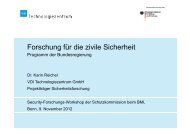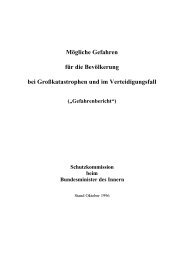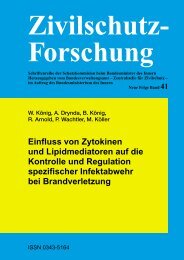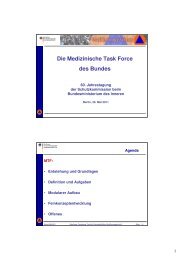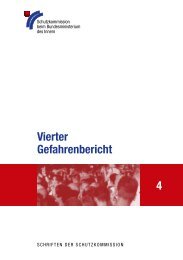Untersuchung zur Einbindung des Öffentlichen ...
Untersuchung zur Einbindung des Öffentlichen ...
Untersuchung zur Einbindung des Öffentlichen ...
Sie wollen auch ein ePaper? Erhöhen Sie die Reichweite Ihrer Titel.
YUMPU macht aus Druck-PDFs automatisch weboptimierte ePaper, die Google liebt.
3. Methods and Results<br />
3.1 Law<br />
A comprehensive analysis and profound commentary on Germany’s Federal acts<br />
and the acts of each German State has been worked out. The information obtained<br />
was synthesized in a synoptic listing of all relevant acts, administrative rules, and<br />
directives identified with their sources indicated. In a closing summary,<br />
considerations for drafts for conclusions valid for all German states were made and<br />
were connected with cautious perspectives for potential consequences for the<br />
German legislation and the executing administration.<br />
The results of our analysis indicate that based on the currently valid catastrophe<br />
prevention and health service acts the tasks of catastrophe prevention can be<br />
completely fulfilled. Where there is lack of explicit wording in the acts – and this<br />
is the regular case – reactions in the sense of clear wording to the letter should not<br />
be demanded. This would only lead to an unnecessary legislative over-expansion<br />
through over-regulation; such a development, however, would be contrarily to all<br />
repeated efforts of de-regulation. In favour for the fact that the existing acts do not<br />
have deficits, the following must be taken into consideration: in the catastrophe<br />
prevention acts of the German States, authorizations to enact administrative rules<br />
and directives can only be found sporadically, and where it is the case, they are not<br />
specifically related to a topic (e.g., see § 43, part 1, No. 1, LBKG (catastrophe<br />
prevention act of the State Rheinland-Pfalz). From the legislative body’s viewpoint,<br />
this indicates also that there is no need for a more intensive regulation, even with<br />
regard to the executive. The formal acts are regarded to be dedicated and sufficient;<br />
everything else can be regulated on an operational level, i.e. by means of<br />
administrative and organisational measures through executive ways. Thus, all goals<br />
must be achieved through fulfilment and execution of the existing acts in the sense<br />
of their true meaning, and – protected by law – can be accomplished. As a<br />
conclusion – shortened as a thesis – the following recommendation for future<br />
direction is made: Comprehensive use of all options of the existing acts prece<strong>des</strong><br />
the creation of further new acts or a change of existing acts.<br />
3.2 Matters of Education and Training of Physicians and Non-Physician<br />
Professionals in the German Public Health Service<br />
All current curricula from the obligatory educational study programs for<br />
physicians in medical schools and postgraduate training programs for the boards<br />
of public health physicians were systematically evaluated for items related to<br />
preparedness, response, and containment of catastrophes and disasters. The<br />
evaluations were based on the official German “Item Catalogue of the Institute for<br />
Medical and Pharmaceutical Questions for Examinations” for medical students<br />
and on the official educational Guidelines of the German Federal Board of Public<br />
Health Physicians for public health physicians. Additionally, the obligatory 6months<br />
school course during the training for public health physicians in Germany<br />
was evaluated for aspects relevant for catastrophe and disaster medicine. With<br />
19



